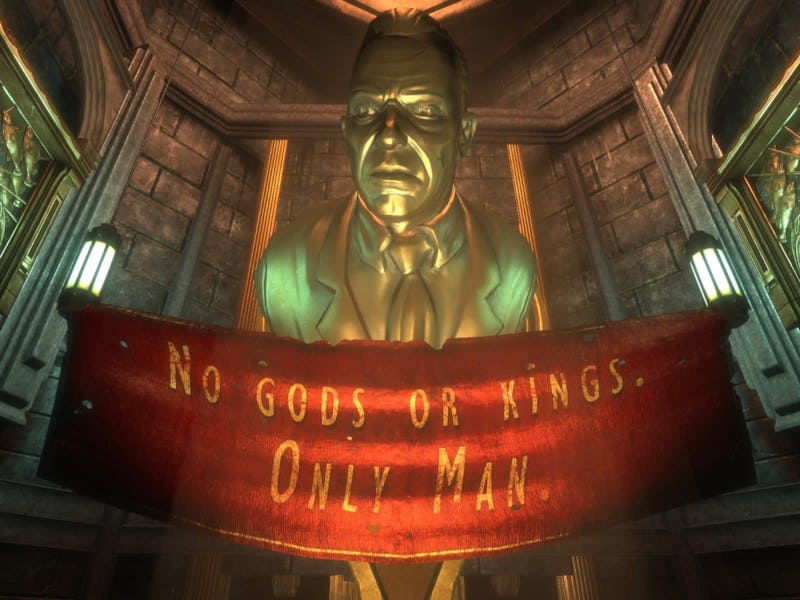Netflix's BioShock movie needs to cut the game's most iconic moment
How do you adapt one of the greatest twists in gaming?

BioShock looms large over the games industry. In the 15 years since its 2007 release, it has managed to become one of the most important games of the 21st century and has influenced countless titles that have come after it. Such a successful game inevitably will attract a film adaptation — it’s almost surprising that it’s taken this long for Netflix to make moves.
Though it has been in limbo for a long time, the BioShock movie is back on track with an impressive list of creatives attached. But the elements that made BioShock so successful as a game are hard to translate into another medium, creating a uniquely difficult problem to solve if Netflix wants to preserve what makes the franchise special.
Trouble in Paradise
There has been more than one attempt to make a BioShock film.
The history of the BioShock movie is nearly as old as BioShock the game.
First announced less than a year after the game’s initial release, the BioShock movie was originally going to be helmed by Pirates of the Caribbean director Gore Verbinski. Universal also hired The Aviator screenwriter John Logan, enlisting two high-profile names that gave the project some weight behind it.
Universal positioned Bioshock against the then-recent failed attempt to adapt Halo into a live-action film. The initial press release announcing BioShock talked about why this project would actually get made and not end up in an endless turnaround. Time has not been kind to this press release.
Directo Frances Lawrence is helming the latest attempt at a BioShock movie.
Over the next several years, the BioShock movie was met with several delays. A combination of other failed video game movies and an aversion to R-rated projects from higher-ups in Universal led to the project effectively being stuck in development hell indefinitely.
Netflix revived the BioShock movie in February of 2022, announcing their plans to adapt the video game.
As of August 25th, director Francis Lawrence (I Am Legend, The Hunger Games: Catching Fire, Slumberland) and writer Michael Green (Logan, Blade Runner 2049, American Gods) are attached to the project. But in the shadow of the cancellation of the streaming service’s Resident Evil series, it remains to be seen if this project will find success. An uncertain thing considering the iconic twists of BioShock.
A Man Chooses
BioShock questions the agency of the player.
This question is at the heart of BioShock. Sent on a series of chores by a voice on a radio, the player checks everything off their to-do list when they are asked “Would you kindly?” accomplish the task. Games are about completing arbitrary quests given to you without much second thought. BioShock played on this to tell a meta-narrative about video games as a storytelling medium.
When it is revealed that everything you have done in the game is all because you have no free will, the story is recontextualized as a commentary on the player’s willingness to follow orders without question. “Would you kindly?” functions as a kind of very specific brainwashing, forcing the player character into doing whatever is requested of them. While this story has some limitations it continues to be discussed ad nauseam.
It raises questions about player agency and what it means to interact with a game. As the person pushing forward the game’s narrative, what is the complicity of the player in the violence and suffering that those within the narrative experience? Throughout the first two BioShock games, the integral choice is whether to save or kill the Little Sisters. (These genetically altered young girls have been mentally conditioned to retrieve the gene-altering ADAM substance lingering in corpses around the underwater city of Rapture.)
This choice of mercy changes the end of the game based on how merciful the player was, but even this facet of the story works because of the interactivity of video games as a medium.
The cinematic atmosphere of BioShock is suitable for a movie, but the game’s meta-narrative is not.
BioShock is a game about video games. Steeped in the artistic strengths and limitations that the artform is reliant on. Adapting this story into another medium such as film is immediately an uphill battle.
Verbinski’s original script made its way into the hands of the public years after Universal’s adaptation died and attempted to adapt the original game shot for shot. While the spectacle of Rapture translates to film, the blank slate protagonist does not. Jack is empty to provide the player with a way to put themselves fully in the game’s narrative, making the emotional weight of the twist even more powerful. But in film, it just comes across as bland.
Verbinski said BioShock was “brimming with cinematic potential” when the film adaptation was first announced in 2008. This potential relies on the atmospheric world of Rapture. The underwater art deco utopia gone wrong sure is a unique vibe. Yet Rapture itself is only the set dressing that gives way for BioShock to tell its story, the things that make BioShock great are unique to the medium of video games. Relying on cinematic potential without understanding the original game is what has led to video game adaptations becoming synonymous with bad movies.
Adaptation relies on more than just lifting a story from one medium to the other. For a BioShock movie to work, Netflix needs to unshackle itself from the shadow of the original game and find a new story within the world.